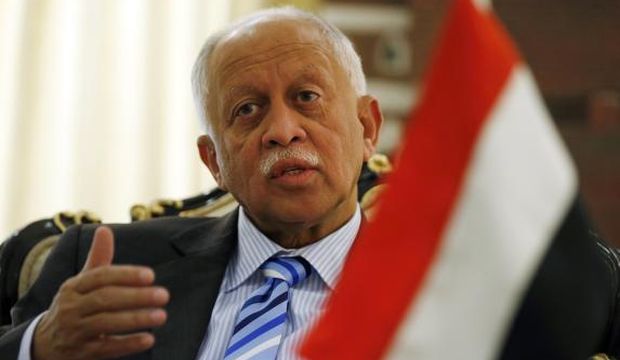
A picture taken on April 1, 2015 shows Yemen’s Foreign Minister Riyadh Yassin talking to the press at the Yemeni embassy in the Saudi capital Riyadh. (AFP Photo/Stringer)
“I do not think there will be a second Geneva [conference] on Yemen,” Yassin said in an exclusive interview with Asharq Al-Awsat.
“Should the UN Envoy to Yemen Ismail Ould Cheikh Ahmed wish to consult with the two sides… there is no need for the UN to host talks between the government and the armed militia,” he said, referring to Houthi insurgents.
UN-sponsored peace talks between the delegation of President Abd Rabbuh Mansur Hadi and that of the Houthi movement ended in Geneva last week without producing a ceasefire deal with the government blaming the rebels for obstructing progress.
While Yemen’s government said it wanted Houthis to withdraw from the cities and towns of Yemen, the rebel group insisted that coalition-led airstrikes should end first.
Yassin said Ould Cheikh Ahmed could hold separate talks with “the government’s delegation in Riyadh and the Houthis in Sana’a.”
Hadi’s FM said Yemen’s government-in-exile will work with UN envoy and the international community to try to find a mechanism for implementing UN Security Council resolution 2216 that calls on the rebel group to put down weapons and pull out of areas under their control.
In late March, Saudi Arabia and Arab allies launched an aerial campaign against Houthi positions in Yemen with the aim of restoring Hadi to power.
Houthis overran large parts of Yemen in September and mounted a coup against President Hadi, prompting him to flee to Riyadh.
Yassin welcomed Oman’s peace efforts on Yemen, but said that the sultanate had confirmed to the Yemeni government that it did not intend to propose any peace initiative.
Yemen’s FM said that his Omani counterpart, Yusuf Bin Alawi Bin Abdullah, “confirmed to us during our meeting in Kuwait that there was no initiative on Yemen from his government’s side.”
The Houthi delegation headed to Muscat after leaving Geneva on Sunday, Yemen’s Human Rights Minister Ezz Al-Din Asbahi told Asharq Al-Awsat last week.
According to the minister, it was unclear what kind of talks the Houthis would hold in Muscat.
Eyewitnesses said violent clashes erupted between Houthis in the western city of Al-Hudaydah on Thursday following a dispute over the distribution of fuel they had stolen.
A senior Houthi leader and three local fishermen were killed and others injured in the fighting that broke out in the western seaport city.
Meanwhile, pro-Hadi forces, known as the Popular Resistance, stepped up attacks against the Houthis in Hudaydah on Thursday.
“[Pro-Hadi] militants fired two RPG rockets at a building in northern Hudaydah where a Houthi leader was thought to be staying,” eyewitnesses said.
The building was heavily damaged but it was unclear whether there were any casualties.
Wael Hazzam contributed reporting from Al-Hudaydah
